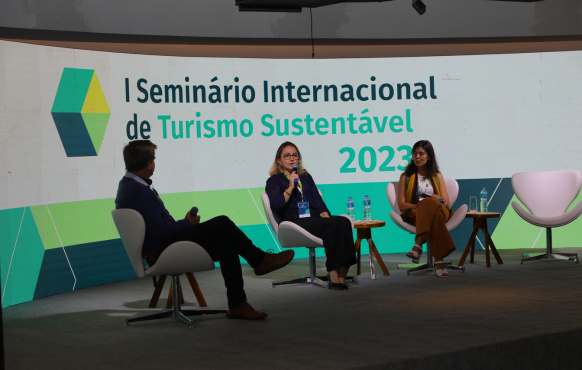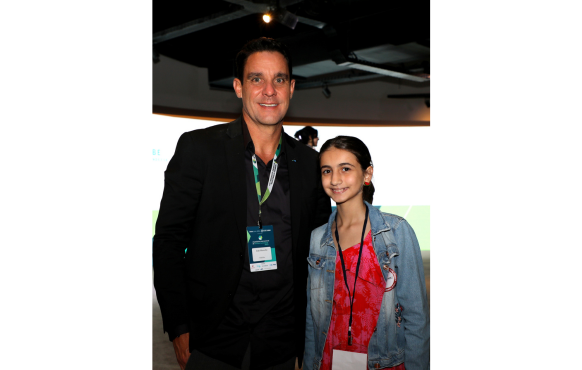
Maria Domingues, representative of CPAP and Andrea Feio, vice president of RioTur participating in a lecture mediated by Mauricio Werner at the event - Alexandre Macieira
By: Maria Eduarda Macieira (Grade 3)
Have you ever thought of having fully sustainable tourism in Rio de Janeiro? How would it be? Would make a lot of difference, as nowadays we have some problems that can affect both tourists and the people who live here. Well, some of these problems are the pollution in the beaches, having trash in the sea and in the sand. This can affect the tourists that come to the city to explore and affect all the tourism and health systems of the ones who live here already. Many people that go to the beach buy plastic bottles to drink water, for example. Why don’t they use metal bottles that you can use all day, all week long?
Well, I went to a really cool event that talks exactly about that topic: Sustainable Tourism. The event was the Seminário Internacional de Turismo Sustentável 2023, organized by OrlaRio. It took place in the National Hotel, in São Conrado, on June 6th. At the event, many important people were invited to participate in the lectures, explaining topics and presenting good projects.
Maria Domingues is a specialist of CPAP (Circular Plastics in the Americas Program), a project financed by the European Union, that is supporting the transition of the plastic value chain to a more sustainable one. The project is happening in Brazil and in Colombia. It started in 2021 and it has been going on until now, where they talk to the public authorities and the stakeholders of the plastic sector to understand what are the main challenges that the city is facing and, based on them, design solutions. Based on these, projects come out. Maria thinks that the project is very important: “CPAP is important because it brings stakeholders. Because in CPAP we have the cities, the public authorities, the companies and social organizations that get together to discuss the same problem with very different perspectives, and then you design solutions that make sense for everyone.”
To Maria, this type of event and initiatives that encourage people to take care of the environment are very important. “It’s important to create awareness, show people that this is not only for the environment, but can also lead to financial benefits. When you have a new business model that embraces sustainability, you’re also preserving the natural resources, bringing other customers and clients to have a more social and environmental awareness, increasing the customers and sailors and also preserving the environment. So it’s a new kind of business model that is important for people to be aware of”, she said.
Maria talked about Praia Circular too, that is one of the projects of CPAP and the idea is to work with the tents, kiosks and hotels to support them in this sustainable transition, working together to better understand this process. So, CPAP supports the awareness with dedication and capacitation, so everyone feels empowered to make a more sustainable decision and to monitor how many plastics are being used before and after the project, to see if it went well.
At the event, Henrik Jensen, the Denmark international director of CLEAN, which is one of the companies that implement CPAP, was present. According to Henrik, CLEAN was created to support capable people from the scientific and academic side with the companies and alongside with the cities. So they are a group of people that work with the businesses, cities and universities. CLEAN takes part in projects in Brazil, India, Africa and the United States, for example, to learn from other parts of the world. Denmark is part of the European Union, so they have this partnership with CPAP too.
Besides Praia Circular, Henrik talked about some other initiatives that have been done here in Brazil. “We work with an organization called C40 Cities, which is an organization of 96 very big cities in the world. São Paulo, Salvador and Curitiba are also members of this organization and they help each other with problems that big cities have. If we have a lot of people, you have a lot of problems. A lot of people have a lot of waste, use of water, and pollution from the air. So, these groups of cities are dealing with the waste in Rio and São Paulo, so they create the biogas that can be used in the energy for cars and trucks, for example”, said Henrik.
Now, reflecting about our city, Rio de Janeiro, how can we help to have sustainable tourism? Well, Andrea Feio, vice president of RioTur, talked a little about it: “70% of the trash here is plastic, and it takes approximately 400 to 500 years to decompose in nature. Imagine we have a city polluted by plastic and it takes so much time to decompose.” So she thinks that these types of initiatives and events are important for the population and for the tourists.
Tiny acts can change the daily life of all the population of a city. For Andrea, the best thing is to set an example and to communicate. “If each one throws your trash away correctly and is worried about what is on the floor, this is one of the actions: each one does your part. The second action that we believe is that the Public Power, being an organ that needs to take care of the population, can put projects in posts in social media, communication, explaining how it works and showing the importance of that.”
Andrea talks about the partnership of some companies and projects, like Praia Circular, European Union, CPAP and Orla Rio. “The European Union has a lot of experience on that, so it helps us to be more correct in the models that are happening out of here too.”
Related to the projects in our city, Andrea complement that: “RioTur has two projects: the Rèveillon and Carnival that have the trash collecting and costumes collecting on the streets, but our idea is to propose parties with no carbon, that is another challenge besides the quantity of plastic for us, so in everything we are doing with our partners, we are asking for actions that have some sustainable bias”.

João Marcello Barreto, CEO and president of the OrlaRio and Maria Eduarda Macieira - Alexandre Macieira
So, since we are talking about the topic of the event, now let’s learn the opinion of the company and project that made and proposed the event: OrlaRio. João Marcello Barreto is the president and CEO of OrlaRio. He thinks that for us to do sustainable tourism, we need to engage the involved people, and have a strategy plan to do it. OrlaRio has some projects, Recicla Orla being one of them, that takes care of the residues of the kiosks and encourages the people that go there to deposit your trash from home for them to destine it correctly. “We are having green energy, clean energy projects too. So we have already 75 kiosks connected to a solar farm and our objective is for all our kiosks to have this clean energy”, adds João Marcello. Another project is the reduction of plastics, to substitute all the plastic and isopor packets by sustainable ones. “We have the ‘Lixo 0’ project too and events involving it. ‘Lixo 0’ is throwing 94% of all the trash you produced away correctly. And all the material that would go to the trash can is being designated in the construction of furniture.”
About the partnership with other projects and companies, João Marcello says: “The European Union is investing in the project and encouraging the reduction of plastic. About the Praia Circular project, our objective is to show that we can change this”.
Amyr Klink, a brazilian sailor and writer, was at the event, and he did a closing lecture about his life and his history. In the interview for our report, he talked about the importance of this type of event to preserve nature, sustainability and sustainable tourism. “Rio is a beautiful city, but with big problems. Sometimes we don’t see the potential, the nice things we can do, the value we can add to the life of these citizens. And I think it is very important. I was in Rio last week in an event like this talking about contamination of Guanabara Bay and Rodrigo de Freitas Lagoon, and I was very enthusiastic about this event, because it was the first time they gave us signs that the quality of the water is improving there. So I think this kind of event is extremely important.”
Therefore, according to Amyr’s words and all of the other members that talked about this type of event, the lectures at it, the topic of sustainable tourism makes us reflect about how much we can change about it. Makes us think that a tiny act can change the world and the environment, being a good or bad act. So we need to think and reflect about how to change the bad things into innovation, sustainability and happiness all around the world and in Brazil!
Compartilhe esta matéria:
Retornar ao


